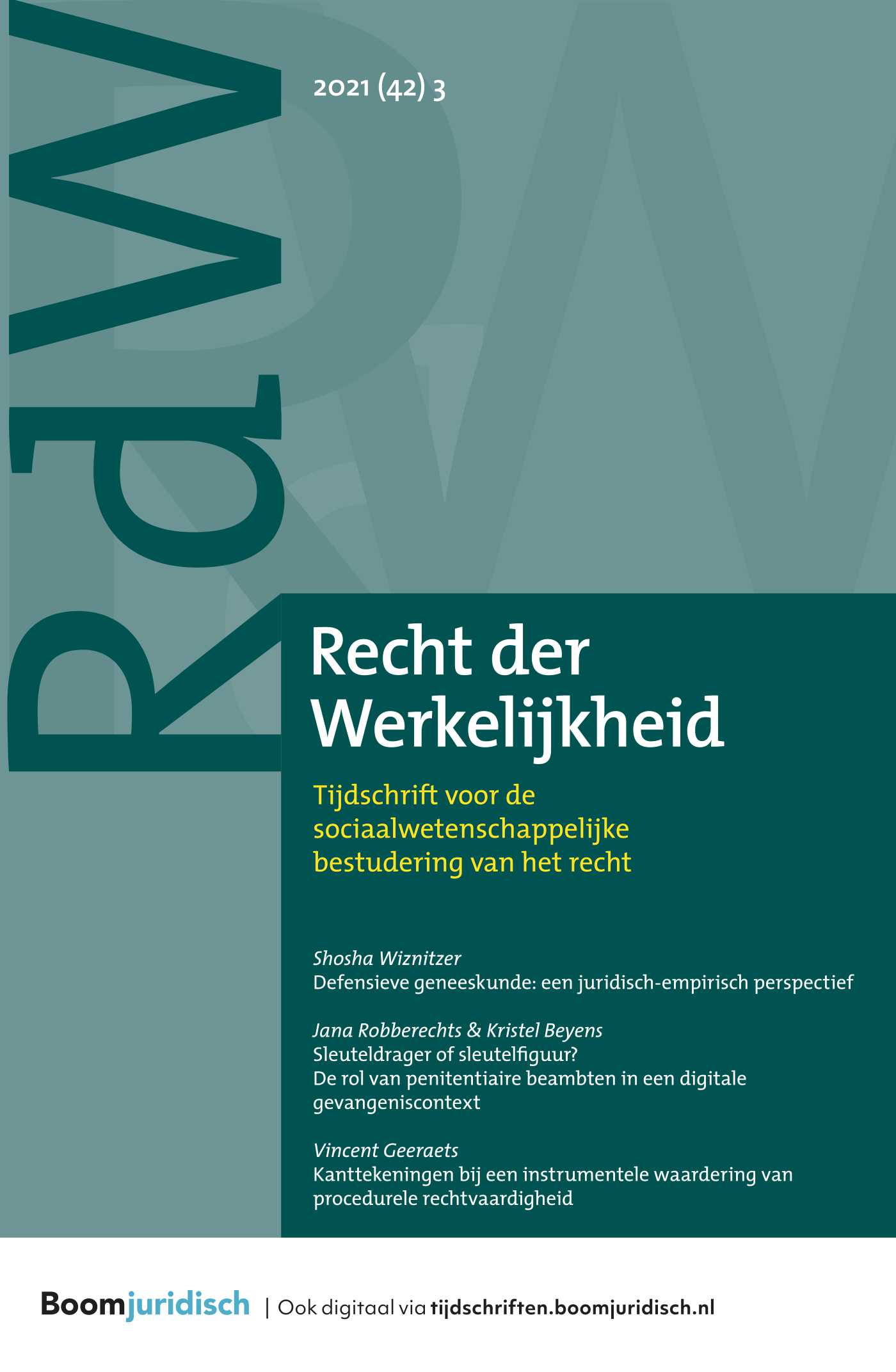|
This editorial offers an introduction to the current issue. |


Recht der Werkelijkheid
Meer op het gebied van Algemeen
Over dit tijdschriftMeld u zich hier aan voor de attendering op dit tijdschrift zodat u direct een mail ontvangt als er een nieuw digitaal nummer is verschenen en u de artikelen online kunt lezen.
| Redactioneel |
De paradigmatische en interdisciplinaire verwantschap van de sociaalwetenschappelijke studie van het recht met het leven en werk van Eline en Vincent Ostrom |
| Trefwoorden | editorial |
| Auteurs | Koen Van Aeken |
| SamenvattingAuteursinformatie |
| Artikel |
Cultuur en werkstijlen van private beveiligers: een vergelijking met politiecultuur |
| Trefwoorden | private security, police culture, private security culture, stress-coping model of police culture |
| Auteurs | Jan Terpstra |
| SamenvattingAuteursinformatie |
|
To what extent do private security workers have a culture that is comparable to the police culture? To what extent can such a private security culture be explained by the use of the so-mentioned stress-coping model of police culture? This comparative survey of a sample of private security workers and a sample of police officers shows that contrary to popular assumptions of increasing similarities between police and private security cultures, in reality there are important differences. Private security workers have a much stronger focus on service tasks than police officers and are less oriented to crime fighting. The stress factors that contribute to a stronger police culture, can also contribute to a similar culture in private security. However, because these stress factors are much less prominent in private security, it may be assumed that such a police-like culture is almost absent among private security workers. |
| Artikel |
Juridische verkaveling van publieke taken: een historische vergelijking van dijkonderhoud en re-integratietaken |
| Trefwoorden | allotment, legal continuity, work reintegration, collective action |
| Auteurs | Robert Knegt |
| SamenvattingAuteursinformatie |
|
In the Netherlands the task of reintegrating partially disabled workers into the labour market, that used to be accomplished by collective institutions, has been redistributed by the government to private actors: those who were the last to employ these workers. It is pointed out that this policy choice implies reusing a medieval legal technique and that its use regenerates typical legitimacy problems. Building on Ostrom’s theory of ‘institutions for collective action’, a historical comparison of the organization of dyke maintenance in the Dutch bog peat areas of the 11th-13th centuries and of these recent policies reveals that both are to be analysed in terms of a ‘double allotment’: duties as to collective tasks are allotted to individual participants in a collectivity by linking them up with a preceding allotment of usage rights, legally formalized in terms of ‘private law’. While neoliberal ideology may account for the direction that recent reintegration policies have taken, it is only in the Netherlands that this legal technique has to such an extent been mobilized. This observation raises questions as to long-term continuities in Dutch policies. |
| Discussie |
Erasmus Law College: active academic learningMet recht goed onderwijs |
| Trefwoorden | legal education, Erasmus Law College, problem based learning, academic learning |
| Auteurs | Suzan Stoter |
| Auteursinformatie |
| Discussie |
Nieuw facultair onderwijsprogramma: waarom eigenlijk? |
| Trefwoorden | legal education, education policy, academic freedom, higher education |
| Auteurs | Miek Laemers |
| Auteursinformatie |
| Boekbespreking |
Naar een evenwichtige en transparante belangeninbreng in de wetsvoorbereiding |
| Trefwoorden | book review |
| Auteurs | Nicolle Zeegers |
| SamenvattingAuteursinformatie |
|
In this feature authors review recently published books on subjects of interest to readers of Recht der Werkelijkheid. |
| Boekbespreking |
Alternatief milieurecht: contextueel, interactief en duurzaam? |
| Trefwoorden | book review |
| Auteurs | Roel Pieterman |
| SamenvattingAuteursinformatie |
|
In this feature authors review recently published books on subjects of interest to readers of Recht der Werkelijkheid. |
| Boekbespreking |
Verstandelijk (on)gewoon in het strafrecht |
| Trefwoorden | book review |
| Auteurs | Leny de Groot-van Leeuwen |
| SamenvattingAuteursinformatie |
|
In this feature authors review recently published books on subjects of interest to readers of Recht der Werkelijkheid. |
| Boekbespreking |
Taalgrens als wetenschapsgrens |
| Trefwoorden | book review |
| Auteurs | Erhard Blankenburg |
| SamenvattingAuteursinformatie |
|
In this feature authors review recently published books on subjects of interest to readers of Recht der Werkelijkheid. |
| Praktijk |
De case van het rookverbod in de horecaInstrumentele en normatieve nalevingsmotieven van horecaondernemers |
| Trefwoorden | compliance, motivational postures, smoking ban |
| Auteurs | Willem Bantema |
| SamenvattingAuteursinformatie |
|
Research on (self-reported) compliance has focused on instrumental explanations like deterrence and other rational choice based calculations. In my text, the focus will be on my operationalization of the normative explanation: motivational postures (an idea developed by Valerie Braithwaite). Motivational postures are clusters of compliance motivations in which the degree of agreement with the rules and the degree of agreement with the regulator have been integrated. Theoretically, there are five different postures. Motivational postures are applied in research in Australia to the contexts of taxing, nursing homes, safety and environmental regulation, but have never been applied to the context of a smoking ban. The motivational postures have been tested in a pilot study. First results of this study revealed that four of the five postures were based on valid and reliable measures. Finally, these motivational postures have a high explanatory value in the analysis on self-reported compliance, even when controlled for instrumental explanations. |
